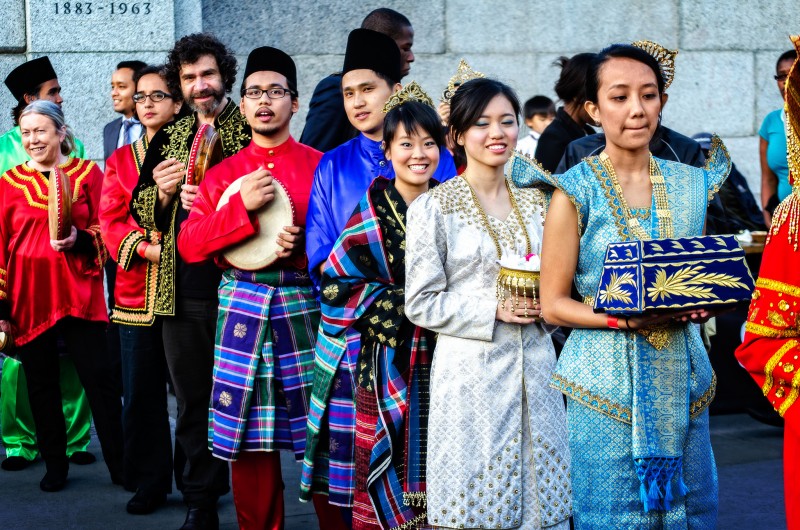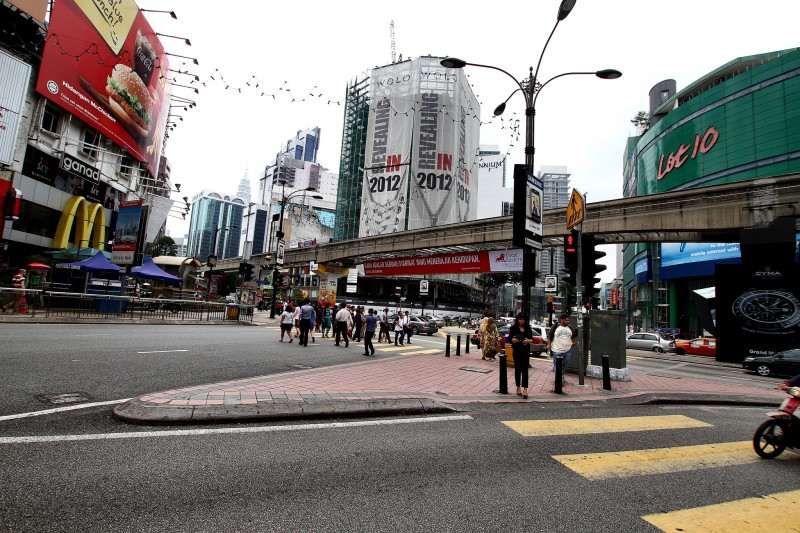
The people of Malaysia
Before we go into the bewildering demographics, the first thing you need to know is this: Citizens of Malaysia are called ‘Malaysians’ not ‘Malays’. Malays refers to people of that race, who are also Muslims and make up the majority of the country’s population.
Malaysia’s diverse ethnic makeup is one of its attractions and you’ll be forgiven for being confused by all the different races. Adding to that, the demographics of West and East Malaysia are significantly different. In West or Peninsular Malaysia, Malays are the predominant race, followed by the Chinese, then the Indians, and smaller minorities like the Serani, who are descended from Portuguese settlers in Melaka.
In the East Malaysian states of Sabah and Sarawak, a different mix of tribes can be found. Sabah’s largest ethnic group is the Kadazandusun, followed by the Bajau as well as a mix of other tribes including the Orang Sungai, Rungus and Murut. The Murut can also be found in Sarawak though the state is more known for its Dayak people, comprising the Bidayuh and the Iban. While the Melanau are a smaller community, they have a strong presence in Sarawak’s politics and economy.
It’s perfectly fine to ask a Malaysian what race or religion they are. We understand that it’s often difficult for foreigners to tell – even Malaysians often have trouble differentiating between the different ethnic groups in East Malaysia!
Language and basic phrases
Bahasa Malaysia or Malay is the national language but as a former British colony, English is taught in schools and widely spoken and used across popular media. You won’t have trouble communicating in English at establishments such as hotels, shopping malls, cafes, and Western-style restaurants. Elsewhere, most can grasp at least basic English.
If you’d like to learn some Bahasa Malaysia, the good news is that it’s an easy enough language to pick up and understand, as most words are pronounced as they are spelled. Wikitravel has perhaps the best introduction to basic Bahasa Malaysia. It explains the basics of the language, has a helpful list of phrases as well as a pronunciation guide. There is also a free online course on basic Malay if you wish to pick up more than just the popular phrases.
Here are some basic words and phrases to get you started. Don’t worry about getting the pronounciation spot on, your attempts will at least endear yourself to the locals!
Terima kasih (tehr-ree-mah kah-seeh): Thank you
Maaf (mah-ahf): Sorry
Tak/Tidak (tahk/tee-dahk): No
Boleh (bow-lay): Can
Bukan (boo-kahn): Not
Kiri (kee-ree):Left
Kanan (kah-nahn): Right
Terus (tehr-roos): Straight on
Nak (nahk): Want
Lapar (lah-pahr): Hungry
Saya (sah-yah): I, or me
Anda (ahn-dah): You
Dia (dee-yah): He/she
Sedap (sehr-dahp): Delicious
Try some Manglish
In KL, English is just as widely spoken as Bahasa Malaysia or to be more accurate, it’s Manglish that you are likely to hear us speak. Malaysian English, like its moniker suggests, is a mangled form of the language that can be confusing at first but once you get the hang of it, you’ll likely find it funny and even practical. Manglish is mostly standard English though it shares some similarities with pidgin English, with little added suffixes and local colour.
Tip: A special note to English speakers: Ninety per cent of the time, ‘a’ is pronounced as in fah-ther and not ‘a’ as in that. The ‘e’ is usually pronounced as in the, and only very occasionally as the ‘e’ as in they.
Say ‘lah’: One of the simplest forms of Manglish is the addition of the suffix ‘lah’ (with the ‘a’ as in father) to the end of sentences. For example: Can lah (Sure, fine by me) or no lah (No, of course not).
On religious sensitivities
Islam is the country’s official religion, and other religions are also practised. For Muslim visitors, finding places to perform the solat is easy as Muslim prayer spaces are everywhere – malls, airports, convention centres, any venue with public access will have one.
Public discourse on matters of faith can be sensitive for some, so unless you know them well enough, it’s best to steer clear of the topic. That doesn’t mean that you can’t, for example, ask someone what their religion is or how certain things are practised in their faith. Showing interest and a curiosity to learn are perfectly acceptable, just keep judgements and harsh criticisms out of the mix.
Avoid offering alcohol or non-halal (kosher) food to Muslims, or consuming any food containing pork in front of them. As a guide, most Chinese food stalls typically serve pork, unless otherwise indicated and except for the ones at shopping malls food courts.

Attitudes towards women
Generally, women in Malaysia enjoy a respectful standing in everyday society and most arenas, from the academic fields to the corporate world. We have the same access to education, healthcare and other rights as the men do. That said, we are not entirely immune to the issues and limitations faced by women around the world.
There is a dearth of women leaders in the political space and chauvinism is not overt but is still there nonetheless. Expect the odd catcall or whistle (this happens to local women too), and men attempting to proposition you – especially if you are a Caucasian woman, due to the unfortunate perception that they are ‘easy’.
Unfortunately, non-Caucasian visitors may occasionally face some rude attitudes or be mistaken for a foreign worker. KL does have a sizeable population of foreign workers, particularly from Indonesia, Nepal, Myanmar, India and Bangladesh. There are many non-documented migrants in this city and the authorities conduct sweeps from time to time. Make sure to have your passport with you in case you’re asked for proof of identity.
General etiquette
Malaysians are generally courteous and appreciate a simple ‘Hello’. Unlike other predominantly Muslim countries, only Muslims will greet other Muslims with the salam (where the tips of the fingers touch briefly and are put to the chest to indicate that the greetings come from the heart).
Some Muslims do not shake hands with members of the opposite sex, so don’t be surprised or offended when your extended handshake goes unreciprocated. The easiest way to know whether a handshake is welcomed is to wait a split second and see whether it is being offered. When it is not being offered, it would be fine to just smile, nod and offer greetings.
With non-Muslim Malaysians, handshakes are perfectly fine and are the usual way of greeting upon meeting someone.
Business etiquette
Business etiquette in Malaysia does not differ much from general global practices though it is helpful to remember that as an Asian and Muslim country, we are generally more conservative than our Western counterparts.
DO dress conservatively unless you’re in an industry such as fashion or entertainment, where dress codes are a little more relaxed. But even so, you might find yourself needing to deal with government officials so keep a smart, sedate suit on standby. Some government offices may bar entry to those who are dressed inappropriately – shorts, sandals, sleeveless attire and skirts above the knee are all no-no’s.
DON’T assume that all meetings and functions will start on time. The infamous ‘Malaysian time’ does come into play often, though not all the time. That doesn’t mean that you should aim to be late but do bring some reading materials or a fully-charged phone to keep you company in case you need to wait.

